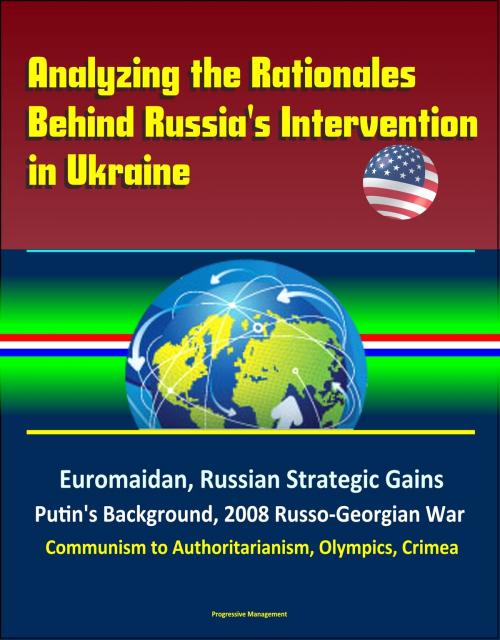Analyzing the Rationales Behind Russia's Intervention in Ukraine: Euromaidan, Russian Strategic Gains, Putin's Background, 2008 Russo-Georgian War, Communism to Authoritarianism, Olympics, Crimea
Nonfiction, History, Asian, Former Soviet Republics, Russia| Author: | Progressive Management | ISBN: | 9781370190782 |
| Publisher: | Progressive Management | Publication: | October 10, 2016 |
| Imprint: | Smashwords Edition | Language: | English |
| Author: | Progressive Management |
| ISBN: | 9781370190782 |
| Publisher: | Progressive Management |
| Publication: | October 10, 2016 |
| Imprint: | Smashwords Edition |
| Language: | English |
This important report has been professionally converted for accurate flowing-text e-book format reproduction. This study examines the rationales behind Russian President Vladimir Putin's decision to intervene in Ukraine through the lenses of neoclassical realism and prospect theory. The risk-acceptant decision to employ hybrid warfare in Crimea was fundamentally due to Putin's loss aversion. Since Putin frames his political decisionmaking reference point in the realm of losses, his decision sought to prevent the imminent losses of Ukraine's Russian-oriented government, Russia's influence in Ukraine, and Putin's own political power at home. It also sought to somewhat recover from the "catastrophic" loss of the Soviet Union's territorial possessions, population, and status. Putin exploited Western leaders' naivete and vulnerabilities to prepare a geopolitical landscape wherein Russia could act without incurring excessive costs. Emboldened by Russia's large financial reserves and backed by Russia's seemingly irrational threats of cutting off essential European gas supplies and launching nuclear attacks, Putin correctly anticipated a limited economic sanctions response and a negligible military response from the West. Putin's decision furthered Russia's interests by acquiring Crimea, the strategically indispensable port of Sevastopol, and vast Black Sea region resources. Such action also thwarted the expansion of Western institutions in Ukraine and incited fervent Russian ethno-nationalism, boosting Putin's domestic approval ratings to an unprecedented level.
CHAPTER I - INTRODUCTION * A. UKRAINIAN EUROMAIDAN AND RUSSIAN INTERVENTION * B. LITERATURE REVIEW: RETURN TO REALISM? * 1. Neorealism and Neoclassical Realism * a. Offensive Realism * b. Defensive Realism * c. Balance of Interests Theory * 2. Contemporary Realist Arguments * a. Spheres of Interest * b. Critiques of Realist Arguments * C. THE DECISION TO INTERVENE * 1. Rational Rationale * 2. Prospect Theory * D. POTENTIAL EXPLANATIONS AND HYPOTHESIS * CHAPTER II - RUSSIA'S STRATEGIC GAINS * A. POST-SOVIET UKRAINE IN CONTEXT * 1. 2004 Ukrainian Presidential Election * 2. 2004 Orange Revolution * 3. Shift in Ukraine's Stance toward Hosting Russian Black Sea Fleet * 4. Russia's Preferred Man Elected and Russian Black Sea Fleet Lease Extended * B. GAINING UNFETTERED ACCESS TO SEVASTOPOL BLACK SEA FLEET PORT * C. ACQUIRING BLACK SEA OIL AND GAS ASSETS * D. MINIMIZING THE PROSPECT OF UKRAINE JOINING NATO * CHAPTER III - SETTING THE STAGE FOR UKRAINE: U.S. AND RUSSIAN RELATIONS * A. ROSE-COLORED GLASSES: THE BELIEF THAT THE PAST HAS NO PLACE IN THE PRESENT * 1. 2008 Russo-Georgian War * 2. Pressing the Overburden Button * 3. First Meetings, Impressions, and Assessments * 4. A False Image * B. THE IMPACT OF PUTIN'S BACKGROUND * C. A RED LINE IN SYRIA * D. DO AS I SAY, NOT AS I DO * E. ARROGANCE AND HUMILIATION * F. DIFFICULT QUESTIONS * CHAPTER IV - BOOSTING DOMESTIC SUPPORT AND FORGING A NATIONAL IDENTITY * A. A STRONG LEADER AND STABILITY * 1. Social Contract and Hybrid Democracy * B. FROM COMMUNISM TO AUTHORITARIANISM * 1. Undemocratic Succession * 2. Consolidation of Executive Power * 3. Harnessing the Energy Champions * 4. Controlling the Media and the Legal System * 5. Crony Capitalism and Corruption * 6. A Stagnant Economy Propped up by Petroleum * C. A REGIME PRONE TO FISSURE * 1. An Exit-Minded Russian Middle-Class * 2. A Significant Change in Willingness to Voice Discontent * 3. Putin's Fear of Losing Power through a Color Revolution in Russia * 4. A Third-Term President
This important report has been professionally converted for accurate flowing-text e-book format reproduction. This study examines the rationales behind Russian President Vladimir Putin's decision to intervene in Ukraine through the lenses of neoclassical realism and prospect theory. The risk-acceptant decision to employ hybrid warfare in Crimea was fundamentally due to Putin's loss aversion. Since Putin frames his political decisionmaking reference point in the realm of losses, his decision sought to prevent the imminent losses of Ukraine's Russian-oriented government, Russia's influence in Ukraine, and Putin's own political power at home. It also sought to somewhat recover from the "catastrophic" loss of the Soviet Union's territorial possessions, population, and status. Putin exploited Western leaders' naivete and vulnerabilities to prepare a geopolitical landscape wherein Russia could act without incurring excessive costs. Emboldened by Russia's large financial reserves and backed by Russia's seemingly irrational threats of cutting off essential European gas supplies and launching nuclear attacks, Putin correctly anticipated a limited economic sanctions response and a negligible military response from the West. Putin's decision furthered Russia's interests by acquiring Crimea, the strategically indispensable port of Sevastopol, and vast Black Sea region resources. Such action also thwarted the expansion of Western institutions in Ukraine and incited fervent Russian ethno-nationalism, boosting Putin's domestic approval ratings to an unprecedented level.
CHAPTER I - INTRODUCTION * A. UKRAINIAN EUROMAIDAN AND RUSSIAN INTERVENTION * B. LITERATURE REVIEW: RETURN TO REALISM? * 1. Neorealism and Neoclassical Realism * a. Offensive Realism * b. Defensive Realism * c. Balance of Interests Theory * 2. Contemporary Realist Arguments * a. Spheres of Interest * b. Critiques of Realist Arguments * C. THE DECISION TO INTERVENE * 1. Rational Rationale * 2. Prospect Theory * D. POTENTIAL EXPLANATIONS AND HYPOTHESIS * CHAPTER II - RUSSIA'S STRATEGIC GAINS * A. POST-SOVIET UKRAINE IN CONTEXT * 1. 2004 Ukrainian Presidential Election * 2. 2004 Orange Revolution * 3. Shift in Ukraine's Stance toward Hosting Russian Black Sea Fleet * 4. Russia's Preferred Man Elected and Russian Black Sea Fleet Lease Extended * B. GAINING UNFETTERED ACCESS TO SEVASTOPOL BLACK SEA FLEET PORT * C. ACQUIRING BLACK SEA OIL AND GAS ASSETS * D. MINIMIZING THE PROSPECT OF UKRAINE JOINING NATO * CHAPTER III - SETTING THE STAGE FOR UKRAINE: U.S. AND RUSSIAN RELATIONS * A. ROSE-COLORED GLASSES: THE BELIEF THAT THE PAST HAS NO PLACE IN THE PRESENT * 1. 2008 Russo-Georgian War * 2. Pressing the Overburden Button * 3. First Meetings, Impressions, and Assessments * 4. A False Image * B. THE IMPACT OF PUTIN'S BACKGROUND * C. A RED LINE IN SYRIA * D. DO AS I SAY, NOT AS I DO * E. ARROGANCE AND HUMILIATION * F. DIFFICULT QUESTIONS * CHAPTER IV - BOOSTING DOMESTIC SUPPORT AND FORGING A NATIONAL IDENTITY * A. A STRONG LEADER AND STABILITY * 1. Social Contract and Hybrid Democracy * B. FROM COMMUNISM TO AUTHORITARIANISM * 1. Undemocratic Succession * 2. Consolidation of Executive Power * 3. Harnessing the Energy Champions * 4. Controlling the Media and the Legal System * 5. Crony Capitalism and Corruption * 6. A Stagnant Economy Propped up by Petroleum * C. A REGIME PRONE TO FISSURE * 1. An Exit-Minded Russian Middle-Class * 2. A Significant Change in Willingness to Voice Discontent * 3. Putin's Fear of Losing Power through a Color Revolution in Russia * 4. A Third-Term President















